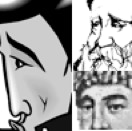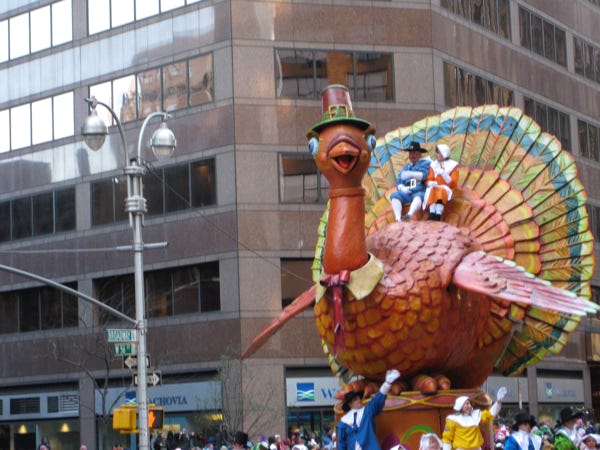
RASHI, RAMBAM and RAMALAMADINGDONG
A Quizbook of Jewish Trivia Facts & Fun

A Quizbook of Jewish Trivia Facts & Fun
This year Americans will be celebrating the 400th anniversary of the first Thanksgiving feast which took place in Plymouth Colony in 1621. At that event, roughly 50 Pilgrims came together with more than 100 American Indians to celebrate a successful harvest. There was some concern in the past among Jews as to whether observance of the holiday might violate the proscription against copying “the ways of the Gentiles.” However, the great 20th century Orthodox authorities Rabbi Moshe Feinstein and Rabbi Joseph Soloveitchik agreed that the holiday is secular, not Christian, and therefore celebration by Jews is not religiously prohibited. There has been another controversy around the holiday, however. What past Thanksgiving event led a group of rabbis to protest?

The famous Macy's Turkey by Ben W is licensed under CC BY-SA 2.0
A. In the mid to late 1800’s, the largest producers of turkeys were Arkansas and Virginia. Being fresh on the heels of the Civil War, and recognizing that New York had a very sizable hog farming industry, in 1867 Governor Reuben Fenton of New York called on New Yorkers to “punish the people of the states of insurrection, and support the good people of the state of New York, by gracing your Thanksgiving table with ham rather than turkey.” A group of rabbis protested that the governor’s comments were insensitive to the “beliefs of the children of Abraham, who are also good citizens of New York.”
B. In Israel, it is a tradition for the President to attend a Thanksgiving dinner at the United States Embassy. But in 2007, rabbis from a number of Chassidic sects, including the Belz, Ger and Bobov, protested when Israeli President Shimon Peres attended the event. In that year, Thanksgiving happened to fall on the 10th of Tevet, a minor fast day commemorating the siege of Jerusalem by Nebuchadnezzar in 597 BCE. The rabbis did not believe that the Israeli president should have attended a meal celebration on that date, even though only a small number of very religious Israelis observe the fast.
C. In 1868, Pennsylvania Governor John W. Geary issued a proclamation calling on Pennsylvania citizens to celebrate Thanksgiving by praising “the name of God and magnify Him with thanksgiving,” and to pray that “our paths through life may be directed by the example and instructions of the Redeemer, who died that we might enjoy the blessings which temporarily flow therefrom.” All seven of Philadelphia’s rabbis criticized the governor for his exclusion of Israelites, which they said cast “reflections upon thousands, who hold a different creed from that which he avows.”
D. In 2013, Thanksgiving overlapped with Chanukkah, leading many to reference Thanksgivukkah, and to combine the celebrations. Some people served latkes at their Thanksgiving meal, while others lit Chanukkah menorahs shaped like turkeys. Rabbis from the ultra-Orthodox Satmar community in Brooklyn objected to this combining of the holidays, saying that it was a “chillul HaShem” (a profaning of God’s name) to mix the religious and secular holidays.
E. In 2013, Thanksgivukkah was celebrated by many Jews as the two holidays of Thanksgiving and Chanukkah overlapped. Macy’s, the sponsor of the annual Thanksgiving Day Parade, picked up on that theme by including a giant Menurkey balloon, a turkey which featured Chanukkah candles on its back. However, immediately behind that balloon was a float sponsored by Kraft Macaroni and Cheese. This float featured the Cheesasaurus Rex, and rabbis from the Orthodox Union objected to that float’s position right behind the Jewish-themed balloon, as they felt the dinosaur that was covered with cheese violated the Jewish prohibition of mixing meat and milk.
✡ ✡ ✡ ✡ ✡ ✡ ✡ ✡ ✡
© 2025 MMJZ Services, Inc.